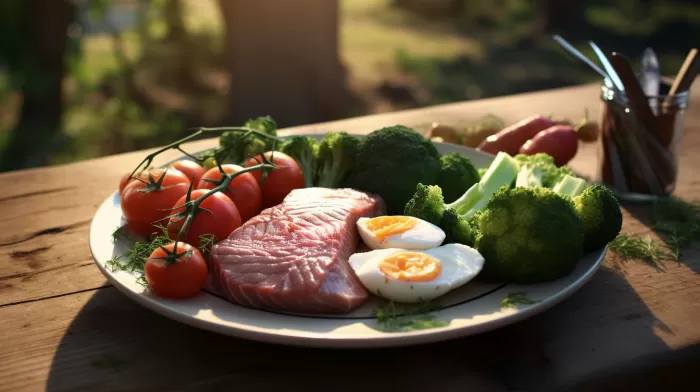Merely cutting calories and limiting how much you eat is not the key to weight control and better health. Much more important for your health are the kinds of foods you eat, not necessarily how much.
Personal Experience with the Paleo Diet
My own personal experience supports this fact. I’ve lost weight and kept it down on the paleo diet despite eating as much as I want at all my meals and never worrying about the caloric content. Yes, I exercise daily, including a weight-lifting program designed to keep my muscles strong, but I am meticulous about what types of foods I eat, not the amounts.
Even though I eat as much as I want, my health hasn’t suffered. As a matter of fact, on the paleo diet, my health has vastly improved. I have lower blood pressure, fewer skin problems, less frequent digestive issues, I think clearer, have more personal energy and am less prone to moodiness.
And the way my health and weight improved once I began to eat paleo is not unique.
Evading Diabetes: The Danish Study
Consider a study performed at the Steno Diabetes Center in Gentofte, Denmark. The Danish researchers investigated the effects of eating fast food from McDonald’s to see how it influenced metabolic events inside the body after a meal. The results were unsettling. The scientists compared the foods’ effects on genetically identical twins. In each case, one twin was overweight and the other twin was slender. But after consuming fast food, the metabolites (chemicals the body makes from food) circulating in the blood of the twins showed that both were having physiological difficulties that made them more susceptible to type 2 diabetes.
The researchers think that this shows that even if you keep your weight down by restricting calories, making poor food choices and eating fast food does physiological harm.
A Calorie is Not Just a Calorie
“Our study contributes to better understanding of the genetic and environmental factors influencing several risk factors which are associated with obesity and metabolic disease (e.g., type 2 diabetes),” says researcher Matej Oresic, Ph.D. “As such, our study may contribute to the efforts aimed at prevention and treatment of metabolic complications associated with obesity.”
In their analyses of metabolites in the blood, the researchers found that in each pair of twins, the heavier twin had more circulating branched chain amino acids (risk factors for diabetes) in between meals. But right after eating a fast food meal, both twins had the same amount. And when the scientists analyzed the bacteria in the gut, they found evidence that the friendly bacteria living in the intestines may have been harmed by the fast food.
“When someone is overweight and at risk for diabetes, the conventional wisdom is to say ‘lose weight,’” says Gerald Weissmann, M.D., the editor-in-chief of The FASEB (Federation of the American Societies for Experimental Biology) Journal, where the study was published, “and to a degree that recommendation holds true. This report, however, shows that a calorie is not just a calorie as some would contend. Exactly what we eat and drink, and not just the number of calories, may be the most important factor in our health.”
Choose Your Food Carefully
On the paleo diet, most people give up grains, soy, dairy, legumes (beans) and processed foods and limit sugar intake. Even if you don’t want to go full-fledged paleo, avoiding grains like wheat, corn, barley, and rye can make a huge difference in your well-being.
Unfortunately, if you look at the primary foods Americans are eating, you find that the top 10 are almost all items that paleo forbids:
- Grain-based desserts (things like cookies, cakes, and donuts).
- Yeast breads.
- Chicken and chicken-mixed dishes (fried chicken or wings).
- Soft drinks, energy drinks, and sports drinks.
- Pizza.
- Alcoholic beverages.
- Pasta and pasta dishes.
- Mexican dishes.
- Beef and beef-mixed dishes.
- Dairy desserts (ice cream, etc.).
If those foods are the major part of your diet, limiting and counting calories won’t save you. You’re missing the vital nutrients from fruits and vegetables. So even if you have a will of iron and can limit your meals to tiny amounts, you will only be benefiting your health a tiny amount if at all.
Conclusion
Counting calories alone is not enough to maintain a healthy lifestyle. Instead, it is crucial to focus on consuming whole, nutrient-dense foods, like those included in the paleo diet, and avoiding processed foods that contribute to poor health outcomes. Not only can this approach lead to weight loss and improved health, but it also supports a more sustainable and enjoyable way of life. It is time for people to stop obsessing over the numbers and start focusing on the quality of their food choices for long-term health benefits.



